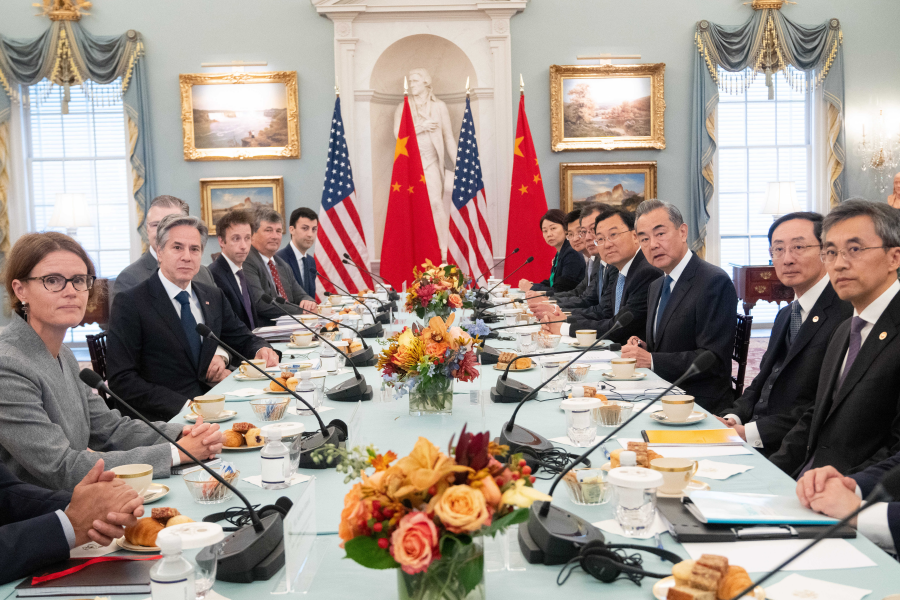
Chinese Foreign Minister Wang Yi (left) meets with U.S. Secretary of State Antony Blinken at the State Department in Washington on Oct 26-27, 2023.
From Oct. 26 to 28, Chinese Foreign Minister Wang Yi paid a visit to the United States by invitation, marking Wang’s first official visit there since February 2016. During the recent visit, he met with U.S. Secretary of State Antony Blinken, National Security Adviser Jake Sullivan and U.S. President Joe Biden. The visit was another landmark event in a new round of bilateral engagement and a step forward in a joint effort to explore paths of peaceful coexistence.
After the Bali meeting between the two heads of state at the end of last year, China-U.S. relations entered a period of turbulence. Early this year, the balloon incident disrupted the stabilizing direction of bilateral ties. It was not until June, when Blinken visited China, that bilateral engagement and interaction were restored. Over the past six months, the two sides have made frequent contacts, established joint working groups in the economic and financial fields and set up a mechanism for regular communication and exchange of information on export controls between their respective commerce authorities. Notably, subnational and people-to-people exchanges have also been reenergized. Not long ago, California Governor Gavin Newsom led a U.S. business delegation to China, and their messages sounded more positive than those of U.S. officials.
Recent developments show that contacts and positive interactions between the two countries remain promising. The relationship could remain resilient and supple if political interference is managed.
In recent years, U.S. domestic politics have begun to weigh more heavily on China U.S. relations and have become the most intractable disruptive factor. Bipartisan concerns about a domestic political deadlock and flawed governance have also been projected into bilateral relations, magnifying the competitive dimension between China and the United States and heightening America's insecurity about its own strength and status.
With that in mind, both the Democrats and Republicans are playing up the supposed “imminent challenge” posed by China as a way of appealing to the American public for greater political support. At the same time, the two parties have also played up the China factor in major domestic legislation by inserting unfair and discriminatory provisions against China in these bills, thus intensifying the confrontation between the two countries.
On the other hand, as bilateral ties remain fraught, irrational factors are more prone to be maliciously amplified, wreaking havoc on relations. Claims about the origin of COVID19 and suspicions that Chinese students are undercover spies are the most infamous. The former has become the most repeated anti-China conspiracy theory in the United States and has been used as a label by some American politicians to show that they are tough on China, which has had a huge negative impact on people-to-people exchanges between China and the United States, sowing mistrust.
Since the Biden administration took office some adjustments have been made, but the fallout of these issues lingers. Over the past six months, the political disruptions in China-U.S. relations have not dissipated, and the two governments are exploring new approaches.
First, China and the United States are leveraging political leadership to counter political interference. The new round of engagement follows the consensus reached by the two heads of state at their Bali meeting — namely, maintaining exchanges and high-level visits, advancing relevant guiding principles, establishing working groups to address practical issues and facilitating people-to-people exchanges. The five areas of consensus reflect the strategic leadership of the two heads of state in charting a new course and advancing China-U.S. relations, which is crucial to reducing the risk of political interference that could throw the relationship out of kilter again.
Second, the two countries need to engage in pragmatic dialogue to increase transparency and reduce the space for political interference. In the latest round of U.S.-China contacts, the dialogue has been more pragmatic and candid, and the messages released from high-levels are clearer.
Joint working groups are also focused on solving pragmatic issues. U.S. officials communicated with Congress in the first instance after the dialogues, elaborating the specific details. These practices allow the world to better anticipate the status of China-U.S. relations and reduce the room for manipulation by those with ulterior motives.
Third, reciprocal and managed competition is needed to prevent frictions from spreading to the political level. Government officials in both countries seem less circumspect about the competitive elements in bilateral relations. During Foreign Minister Wang’s visit to the United States he suggested that the two countries should correctly view the competitive elements in interactions and clarify the concept of national security. On the basis of this mutual recognition, the two sides are adopting a more controlled approach for dealing with competing policies and differences. In the wake of newly announced export control measures by the U.S. against China, the Chinese side has adopted corresponding countermeasures.
Whether the new approaches will work in the long term hinges on follow-up interactions between China and the United States. As Wang said, the road to San Francisco will not be a smooth one. Both sides need to step up their efforts.
On a positive note, China and the United States have gone through many unprecedented events in the past few years, but both sides have worked to see that bilateral ties are not left on autopilot. They have exerted great energy to identify new modes of interaction in the interest of long-term stability. This constructive attitude, shared by both, has paid off, allowing them to find common ground and anchor bilateral ties. This augurs well for the future.
